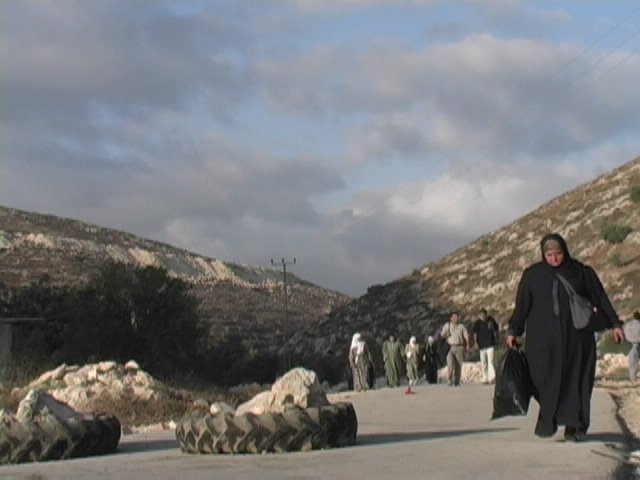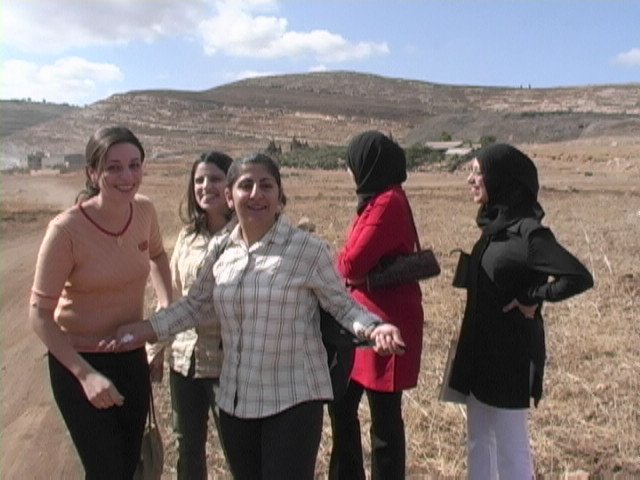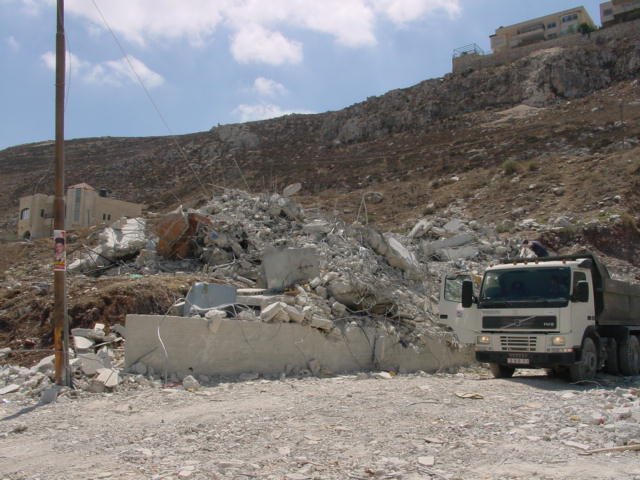September 13, 2003
After a brief taxi ride, the commute continues with a walk through the hills.
Going to School with Jane Doe:
Other commuters walking around the roadblock at Zawata.
Jane lives with her family in Tubas and is in her second year of college, studying pharmacology at an-Najah University in Nablus. Before the closures of the current Intifada, the trip to school took fifteen minutes. Now, on a good day, it takes two hours.
The road is terrifying, but the view is fantastic.
5:15 a.m. Marthame and Elizabeth leave Zababdeh in a taxi going to Tubas.
5:35 a.m. We arrive Tubas, drink coffee with Jane Doe and family. "Jane used to leave earlier, but we were afraid that in the dark soldiers might shoot more easily - it's safer after the sun comes up."
6:25 a.m. The three of us leave Tubas in taxi full of college students going to Nablus.
7:20 a.m. We arrive at Asira, where often travelers can walk along the road and through the hills and find taxis going to Nablus. We walk up for a bit and meet others coming back; soldiers ahead are turning everyone away. We walk back down.
7:45 a.m. We get back in our taxi and start out for the old "Road 17," where people can sometimes walk through.
Pushing the van hoping to jump start it.
8:10 a.m. We arrive at Zawata, where people are walking around the roadblock. Then they come back; soldiers are ahead. We wait in the car, hoping the soldiers leave.
8:45 a.m. The soldiers have not left. The taxi passengers debate: Should we turn back? Should we try another route? Most don't want to come this far for nothing and don't want to miss classes today. Our taxi goes west.
9:30 a.m. We arrive in Beidan. Our driver negotiates with taxis there to find someone willing to try to go Nablus. One is willing so we all load up as a few other travelers join us. Soon we head off to cross the mountains on a long steep, gear-busting ascent on a rocky dirt road. Locally the road is known as "Tora Bora."
10:20 The view is spectacular from the summit, but we all feel carsick from the bouncing and dust. The driver uses his windshield-wipers to clear the sheets of dust from in front of him.
Pushing the van for a second time, hoping to jump start it.
10:35 We have to drive for a couple hundred meters on a settler bypass road to cross it and get onto our next dirt road. As the taxi pulls off the bypass road and tries to go over the roadblock (a big pile of dirt and ditch dug to prevent Palestinians from using the settler road), the motor dies. The driver is frantic to get off and away from the settler road. We all get out and the men push the taxi off the bypass road, and keep pushing, and pushing. Eventually the motor starts again and we all run to get back in. We continue on our way.
Laughter can be a good way to break the stress and tension of such an absurd and dangerous commute.
11:00 We see an army jeep in the distance. A taxi in front of us has pulled over on the side of the road and signals us to wait too. Two young men walk ahead and look around the corner of a building. Then they signal for us to come. Apparently the coast is clear. We go ahead and turn onto a wide open valley of fields.
11:10 In the middle of the valley, the motor dies again. The men push. The women keep an eye out for army jeeps and wonder if they will have to walk to Nablus.
11:20 The motor starts, again we hustle to load up and move on our way.
11:35 We arrive in Nablus. Marthame and Elizabeth are ready for a shower and a nap. Jane and the others in the taxi head off to start their school day.
Later, we met up with "Jane" after her organic chemistry class and took a look at an-Najah University, whose campus is just buzzing with student life in ways we haven't seen at Birzeit or the Arab American University.
Fr. Hossam and Marthame with the children of the Anglican kindergarten.
In the afternoon, Fr. Hossam Naoum, the Anglican priest for Nablus, in whose compound we are staying, took to look at the new church they are building in Rafidia. He is a busy priest, overseeing the construction of the church, St. Luke's Hospital, the Anglican kindergarten (what cute kids!), and the Anglican congregation in Nablus/Rafidia.
Even in the midst of all this uncertainty, there is ample new construction happening all over Nablus.
The rubble of a recently demolished apartment building.
As we left the construction site he took us by the site of a recently demolished apartment building. "The owner spent his life savings on that building. A militant was found hiding in it. He didn't live there, he was just hiding in the stairwell, so they blew it up. All those families lost their homes and their belongings and he lost his life's savings. Just like that. It's a crime."









